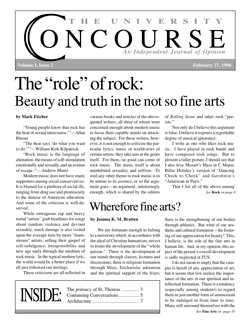What is a ‘real’ Catholic education?
by Kathleen van Schaijik
As an alumna, I find Dr. Crosby’s argument for establishing a core curriculum at FUS extremely persuasive. I regret intensely the lack of it in my own education. In graduate school, I keenly felt my general ignorance in comparison with students from other Catholic liberal arts colleges—almost to the point of being embarrassed to propose myself as a candidate for an MA degree. I am therefore (in company with many friends and fellow alumni) all in favor of the changes proposed by Dr. Crosby.
However, that said, I also want to say that in the lively, campus-wide discussion generated by his article, I have heard two notions frequently voiced (or at least implied) by those on “my side” of the debate, which I think need criticizing: 1) the idea that education consists primarily in the transmission of a given body of knowledge, and 2) the claim that unless students are conversant with the “Great Books” of Western Civilization they have not received any real education, Catholic or otherwise.
These two points are obviously related—both betraying a tendency to conceive of the human mind as a mere receptacle of knowledge, rather than as a living, acting agent, needing to be first of all, not supplied with correct information, but disciplined and trained according to key principles. The aim of a university education, then, is not so much to make us familiar with Great Books, but rather, in Newman’s words, to develop in us “the force, the steadiness, the comprehensiveness and the versatility of intellect, the command over our own powers, the instinctive just estimate of things as they pass before us,”1 which are the fruit of rigorous training and noble influences. I grant gladly that this goal is usually achieved through studying Great Books, but only in part, and then not necessarily.
What is wanted, above all, for real education, is a mind open to Truth and a heart which loves Truth. From this it seems to follow that the most essential mission of a university is to cultivate these in her students. And in this respect, I am happy to say, my education at FUS was superior by far to that of my friends at “big name” schools. They might have come away from their four years with more knowledge, but they came away with less interest—with skepticism almost, and a jaded impression that intellectual cultivation was an exercise in irrelevance. If they have gone on in their studies, it has been strictly with an eye to professional training—medicine or law or what have you.
I, on the other hand, who entered FUS without a shadow of academic ambition, came away from her with a heart in love with Truth, a mind inflamed with longing to know more, and a will determined to fill the (huge) gaps remaining in my understanding. This invaluable gift, for which I never can give enough thanks, I attribute primarily to two things (besides some outstanding teachers and classes): 1) the vibrant, joyous religious atmosphere here, in which my faith flowered and flourished; and 2) encounters with great Catholic intellectual personalities, like Alice von Hildebrand and Tom Howard, who frequently visit the campus here.
And because of the singularly great importance of religious faith for the intellectual life, I will even be so bold as to proclaim my opinion that FUS has in some respects a distinct educational advantage over such admirable institutions as Christendom and St. Thomas Aquinas. Not (certainly) that I question for a moment either their genuine Catholicness or their academic excellence; rather, I say that the special openness and exuberance of the spirituality here, which comes to us through the charismatic renewal, is particularly conducive to the glad, energetic quest for Truth, and moreover, serves (somehow) to protect us from the intellectual snobbishness to which great academic institutions are sometimes prone.
In short, though crippled by serious deficiencies, which we do well to address and repair, I still say Franciscan gives her students in lavish abundance the “one thing necessary” for a Catholic university, namely, an intimate acquaintance with Truth, in the Person of Our Lord, without which all the academics in the world are mere dry bones.
Kathleen van Schaijik
- From the preface of The Idea of a University (p. xvi standard edition) ↑


